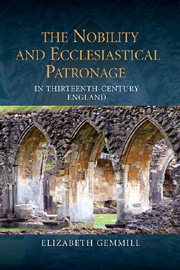Book contents
- Frontmatter
- Contents
- Acknowledgements
- List of Abbreviations
- Introduction
- Part I
- Part II
- 4 Acquisitive Inquisitive Kings
- 5 Speaking With One Voice
- 6 Looking to the Future
- Conclusion
- Appendix of Documents
- Appendix of Magnate Presentations
- Bibliography
- Index
- Other volumes in Studies in the History of Medieval Religion
6 - Looking to the Future
from Part II
Published online by Cambridge University Press: 05 May 2013
- Frontmatter
- Contents
- Acknowledgements
- List of Abbreviations
- Introduction
- Part I
- Part II
- 4 Acquisitive Inquisitive Kings
- 5 Speaking With One Voice
- 6 Looking to the Future
- Conclusion
- Appendix of Documents
- Appendix of Magnate Presentations
- Bibliography
- Index
- Other volumes in Studies in the History of Medieval Religion
Summary
The Statute of Mortmain of 1279 was a response to the concern which had been growing since the early part of the thirteenth century about the passing of lands and rights into the hands of the Church. But how did lay patrons regard the new controls, and how did they react to them?
‘Mortmain’ was a pejorative term for free alms or frankalmoign tenure, for, when land was given to the Church to hold in free alms, the services and feudal incidents hitherto rendered to the lord by the donor were lost or weakened. The concerns about such losses and the legislation designed to control the passing of land into mortmain have been discussed fully by other scholars, particularly Sandra Raban, so that there is need here only to summarise what foreshadowed the 1279 statute. First, Clause 32 of the 1217 reissue of Magna Carta forbade the alienation of so much land that the remainder was insufficient for performance of the services due. Clause 36 forbade grants whereby the donor was re-enfeoffed as the ecclesiastical donee's tenant, so that the donee became mesne between the donor and his lord. Then in 1258, the Petition of the Barons included a request that religious should not be allowed to enter the fees of earls, barons and others in such a way as to cause loss of customs, marriages, reliefs and escheats. Accordingly, in some texts of the Provisions of Westminster of 1259, it was laid down that religious should only enter lands with the consent of the chief lord of the fee, although it is not known whether this clause was included in the Statute of Marlborough of 1267.
- Type
- Chapter
- Information
- Publisher: Boydell & BrewerPrint publication year: 2013



